GLO – Global Labor Organization

Ends;


GLO – Global Labor Organization

Ends;

A new GLO Discussion Paper finds that notwithstanding its beneficial effects, the rapid and widespread diffusion of new technologies poses serious challenges as to their appropriate use once the pandemic will be over and their long-lasting and transformative effects on both social and industrial relations.
GLO Discussion Paper No. 1001, 2021
Covid-19 and Technology – Download PDF
by Caselli, Mauro & Fracasso, Andrea
GLO Fellow Mauro Caselli
Author Abstract: This contribution reviews the rich interdisciplinary literature covering the relationship between the diffusion of COVID-19 and the adoption of technologies in various sectors of the economy, ranging from health care facilities to manufacturing companies. Besides covering the technical and technological progress achieved to enhance contact tracing, tracking and mapping with the intent of stopping the diffusion of the disease, this chapter also discusses the wide range of innovations introduced to detect the disease and treat the affected people. Finally, the analysis addresses how companies and institutions adopted various technologies (from advanced robotics to artificial intelligence) to mitigate the adverse effects of the virus on their employees, customers, and suppliers, as well as to preserve uncontaminated environments and enforce personal distancing in the workplace. In most cases, modern technologies played a key role to transform workplaces, human resource management, production and sale networks. This contribution points out that, notwithstanding its beneficial effects, the rapid and widespread diffusion of new technologies poses serious challenges as to their appropriate use once the pandemic will be over (i.e., privacy data protection and fundamental rights) and their long-lasting and transformative effects on both social and industrial relations.
Featured image: Adli-Wahid-on-Unsplash

GLO Discussion Papers are research and policy papers of the GLO Network which are widely circulated to encourage discussion. Provided in cooperation with EconStor, a service of the ZBW – Leibniz Information Centre for Economics, GLO Discussion Papers are among others listed in RePEc (see IDEAS, EconPapers). Complete list of all GLO DPs – downloadable for free.
The Global Labor Organization (GLO) is an independent, non-partisan and non-governmental organization that functions as an international network and virtual platform to stimulate global research, debate and collaboration.
Ends;

A new GLO Discussion Paper finds that performance pay consistently and importantly associates with greater stress, but the risk tolerant receiving performance pay suffer less stress than the risk averse.
GLO Discussion Paper No. 1000, 2021
Worker Stress and Performance Pay: German Survey Evidence – Download PDF
by Baktash, Mehrzad B. & Heywood, John S. & Jirjahn, Uwe
GLO Affiliate Mehrzad B. Baktash & GLO Fellows John Heywood and Uwe Jirjahn



Author Abstract: While performance pay can benefit firms and workers by increasing productivity and wages, it has also been associated with a deterioration of worker health. The transmission mechanisms for this deterioration remain in doubt. We examine the hypothesis that increased stress is one transmission mechanism. Using unique survey data from the German Socio-Economic Panel, we find performance pay consistently and importantly associates with greater stress even controlling for a long list of economic, social and personality characteristics. It also holds in instrumental variable estimations accounting for the potential endogeneity of performance pay. Moreover, we show that risk tolerance moderates the relationship between performance pay and stress. The risk tolerant receiving performance pay suffer less stress than the risk averse.
Featured image: Jason-Leung-on-unsplash

GLO Discussion Papers are research and policy papers of the GLO Network which are widely circulated to encourage discussion. Provided in cooperation with EconStor, a service of the ZBW – Leibniz Information Centre for Economics, GLO Discussion Papers are among others listed in RePEc (see IDEAS, EconPapers). Complete list of all GLO DPs – downloadable for free.
The Global Labor Organization (GLO) is an independent, non-partisan and non-governmental organization that functions as an international network and virtual platform to stimulate global research, debate and collaboration.
Ends;

A new GLO Discussion Paper finds that vaccination take-up as of November 2021 in England is positively associated with pre-vaccine COVID-19-related deaths.
GLO Discussion Paper No. 999, 2021
When Reality Bites: Local Deaths and Vaccine Take-Up – Download PDF
by Giulietti, Corrado & Vlassopoulos, Michael & Zenou, Yves
GLO Fellows Corrado Giulietti and Yves Zenou


Author Abstract: In this study, we investigate whether COVID-19 deaths that occurred before vaccination rollouts impact subsequent vaccination take-up. We use data on local vaccination rates and COVID-19-related deaths from England measured at high geographic granularity. We find that vaccination take-up as of November 2021 is positively associated with pre-vaccine COVID-19-related deaths, controlling for demographic, economic, and health-related characteristics of the localities, while including geographic fixed effects. In addition, the share of ethnic minorities in a locality is negatively associated with vaccination rates, and localities with a larger share of ethnic minorities increase their vaccination rates if they are exposed to more COVID-related-deaths. Further evidence on vaccination intention at the individual level from a representative sample corroborates these patterns. Overall, our evidence suggests that social proximity to victims of the disease triggers a desire to take protective measures against it
Featured image: Markus-Spiske-on-unsplash

GLO Discussion Papers are research and policy papers of the GLO Network which are widely circulated to encourage discussion. Provided in cooperation with EconStor, a service of the ZBW – Leibniz Information Centre for Economics, GLO Discussion Papers are among others listed in RePEc (see IDEAS, EconPapers). Complete list of all GLO DPs – downloadable for free.
The Global Labor Organization (GLO) is an independent, non-partisan and non-governmental organization that functions as an international network and virtual platform to stimulate global research, debate and collaboration.
Ends;

A new GLO Discussion Paper finds that immigrants’ location decisions respond strongly to long-run, technology-driven changes in their economic opportunities.
GLO Discussion Paper No. 998, 2021
The supply of foreign talent: How skill-biased technology drives the location choice and skills of new immigrants – Download PDF
by Beerli, Andreas & Indergand, Ronald & Kunz, Johannes S.
GLO Fellow Johannes Kunz

Author Abstract: An important goal of immigration policy is to facilitate the entry of foreignborn workers whose skills are in short supply in national labor markets. In recent decades, information and communication technology [ICT] has fueled the demand for highly educated workers at the expense of lower educated groups. Exploiting the fact that different regions in Switzerland have been differentially exposed to ICT due to their pre-ICT industrial composition, we present evidence suggesting that more exposed regions experienced stronger ICT adoption, accompanied by considerably stronger growth in relative employment and wage-premia for college-educated workers. Following this change in the landscape of relative economic opportunities, we find robust evidence that these regions experienced a much stronger influx of highly educated immigrants in absolute terms as well as relative to lower educated groups. Our results suggest that immigrants’ location decisions respond strongly to these long-run, technology-driven changes in their economic opportunities.

GLO Discussion Papers are research and policy papers of the GLO Network which are widely circulated to encourage discussion. Provided in cooperation with EconStor, a service of the ZBW – Leibniz Information Centre for Economics, GLO Discussion Papers are among others listed in RePEc (see IDEAS, EconPapers). Complete list of all GLO DPs – downloadable for free.
The Global Labor Organization (GLO) is an independent, non-partisan and non-governmental organization that functions as an international network and virtual platform to stimulate global research, debate and collaboration.
Ends;
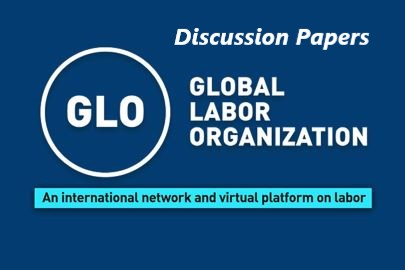
A new GLO Discussion Paper studies how parents decisions to send their children to work are affected by own child labor experiences and social norms.
GLO Discussion Paper No. 997, 2021
Family Social Norms and Child Labor – Download PDF
by Herz, Shirit Katav & Epstein, Gil S.
GLO Fellows Shirit Katav Herz and Gil S. Epstein


Author Abstract: Child labor is a widespread phenomenon and therefore is of interest to both researchers and policy makers. Various reasons for the existence of child labor have been proposed with the goal of designing appropriate solutions. While household poverty is viewed as the main reason for child labor, we choose to focus on the phenomenon that parents who worked during own childhood are more likely to send their children to work. We also look at the effect of social norms on the parents’ child labor decision and analyze both these effects on the supply of labor and equilibrium in the labor market. Finally, we suggest an explanation for the phenomenon of poor societies with similar income levels that differ significantly in literacy rates and propose policy improvements.

GLO Discussion Papers are research and policy papers of the GLO Network which are widely circulated to encourage discussion. Provided in cooperation with EconStor, a service of the ZBW – Leibniz Information Centre for Economics, GLO Discussion Papers are among others listed in RePEc (see IDEAS, EconPapers). Complete list of all GLO DPs – downloadable for free.
The Global Labor Organization (GLO) is an independent, non-partisan and non-governmental organization that functions as an international network and virtual platform to stimulate global research, debate and collaboration.
Ends;

To all supporters, friends, followers, authors and readers:
We wish you happy & healthy holidays; an energetic & inspiring start into 2022; and stay in touch!
Klaus F. Zimmermann, President GLO & Editor-in-Chief, JOPE
For the entire team managing the Global Labor Organization (GLO).
For the team of editors of the Journal of Population Economics (JOPE).

Featured image: Annie Spratt on Unsplash
Ends;

The Bank of Italy is organizing a one-day workshop on human capital, which will take place (in presence, if possible) in Rome on the 25th of March 2022. Chris Neilson (Princeton University) will be the keynote speaker. The size of the workshop will be rather small (8-10 papers) in order to have time for fruitful discussions.
The call for papers is available at this link. The deadline for submission is January 23.
Ends;

On the occasion of the International Migrants Day December 18, 2021 Springer Nature provides free access throughout December to a fine collection of articles of recent migration research. Publication outlets supported by GLO have published seven of the chosen contributions (see below). These include the Journal of Population Economics and the Handbook of Labor, Human Resources and Population Economics.
Explore the latest Springer Nature collection of research on migration and migration studies.
The Economic Geography of Cross-Border Migration
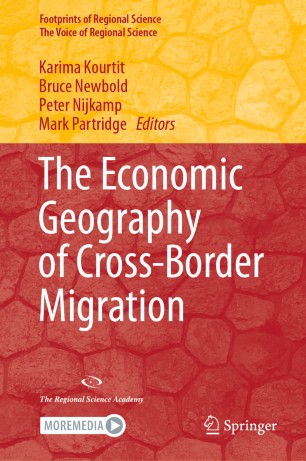
Featured chapter: Free access throughout December

Featured papers: Free access throughout December
Handbook of Labor, Human Resources and Population Economics

Featured chapters: Free access throughout December
Ends;

A new GLO Discussion Paper studies how entrepreneurial ecosystems strengthen high-growth firms.
GLO Discussion Paper No. 996, 2021
Entrepreneurial Ecosystems and Regional Persistence of High Growth Firms: A ‘Broken Clock’ Critique – Download PDF
by Coad, Alex & Srhoj, Stjepan
GLO Fellow Stjepan Srhoj

Author Abstract: The Entrepreneurial Ecosystems (EE) approach makes specific predictions regarding how EE inputs are converted into high-growth firms (HGFs) as an output. A simulation model draws out our hypothesis of regional persistence in HGF shares. Based on intuitions that EEs are persistent, we investigate whether regional HGF shares are persistent, using census data for 2 European countries taken separately (Croatia for 2004-2019, and Slovenia for 2008-2014). Overall, there is no clear persistence in regional HGF shares – regions with large HGF shares in one period are not necessarily likely to have large HGF shares in the following period. This is a puzzle for EE theory. In fact, there seems to be more persistence in industry-level HGF shares than for regional HGF shares. We formulate a ‘broken clock’ critique – just as a broken clock is correct twice a day, EE recommendations may sometimes be correct, but are fundamentally flawed as long as time-changing outcomes (HGF shares) are predicted using time-invariant variables (such as local universities, institutions and infrastructure).

GLO Discussion Papers are research and policy papers of the GLO Network which are widely circulated to encourage discussion. Provided in cooperation with EconStor, a service of the ZBW – Leibniz Information Centre for Economics, GLO Discussion Papers are among others listed in RePEc (see IDEAS, EconPapers). Complete list of all GLO DPs – downloadable for free.
The Global Labor Organization (GLO) is an independent, non-partisan and non-governmental organization that functions as an international network and virtual platform to stimulate global research, debate and collaboration.
Ends;

The 4th Renmin University of China, Beijing & GLO Conference 2021 on Chinese labor market issues took place online on December 12, 2021 organized by the School of Labor and Human Resources together with GLO. The event was supported by the Journal of Population Economics.
Organizers: Liqiu Zhao (Renmin University of China and GLO); Corrado Giulietti (University of Southampton and GLO, Associate Editor Journal of Population Economics); Zhong Zhao (Renmin University of China and GLO, Associate Editor Journal of Population Economics). The conference was opened by GLO President & Editor-in-Chief Klaus F. Zimmermann (Renmin University of China & Free University of Berlin). Zimmermann mentioned that the journal has published important Chinese studies and will continue to do so.
The full academic program is provided below.
Papers in the Journal of Population Economics Invited Session can be accessed here:
Just published online first in the Journal of Population Economics:
Participants:









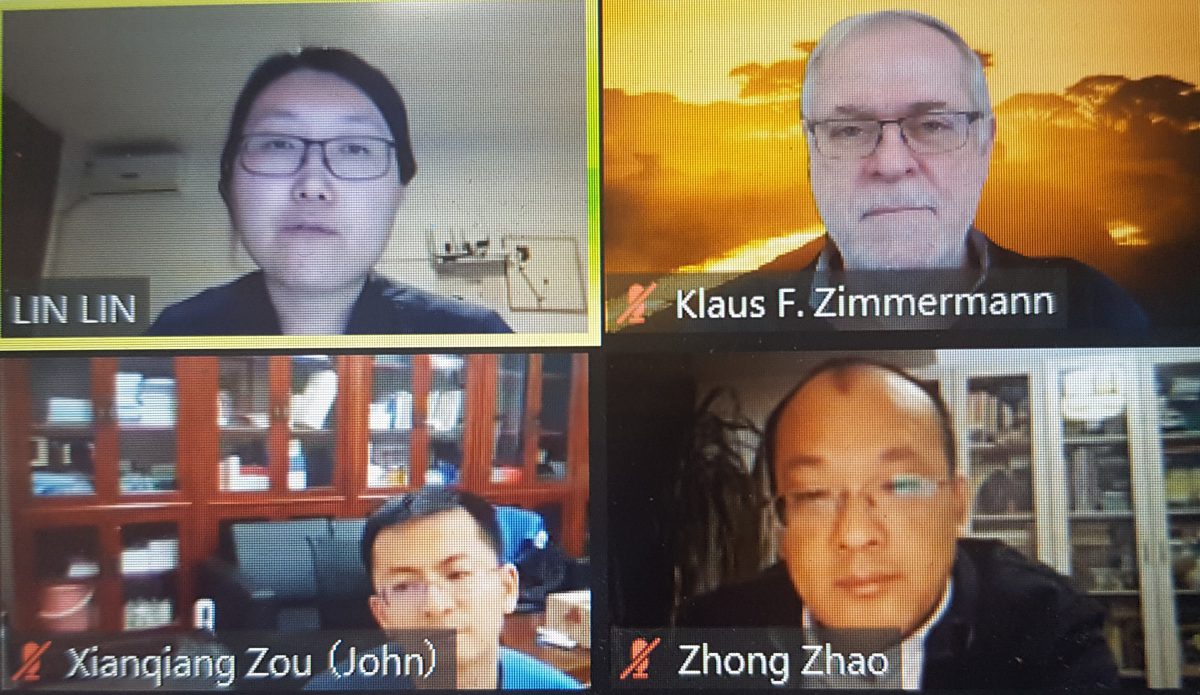
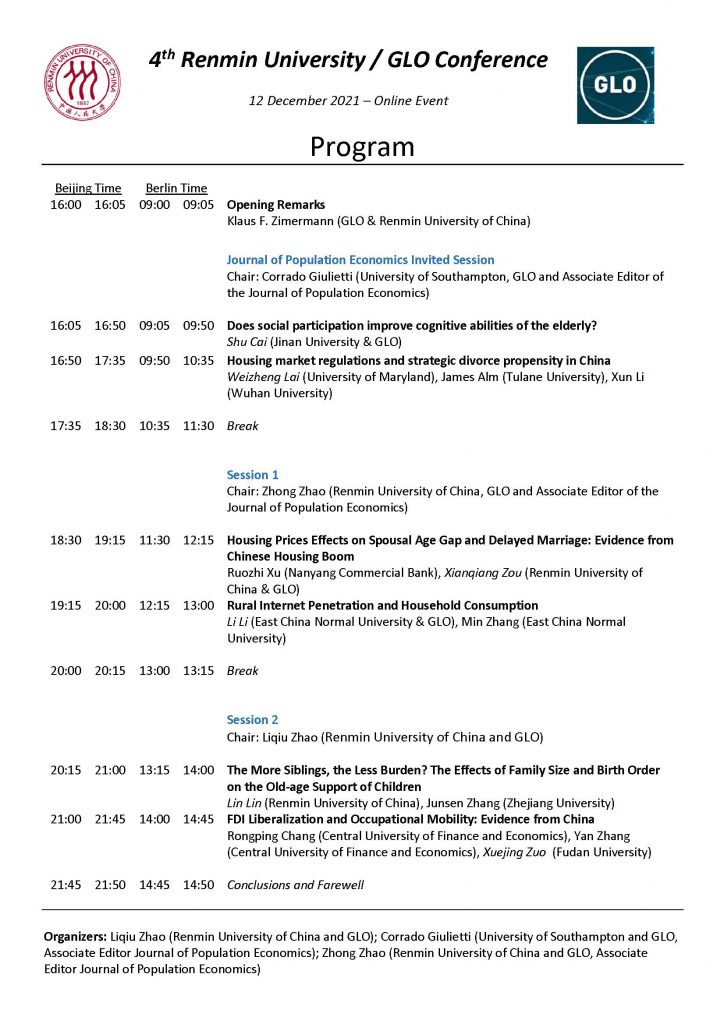
Ends;

A new GLO Discussion Paper details the gender gap in Economics among bachelor’s and master’s graduates in Italy between 2010 and 2019.
GLO Discussion Paper No. 995, 2021
Adams and Eves: The Gender Gap in Economics Majors – Download PDF
by Bertocchi, Graziella & Bonacini, Luca & Murat, Marina
GLO Fellows Graziella Bertocchi, Luca Bonacini & Marina Murat



Author Abstract: We investigate the gender gap in Economics among bachelor’s and master’s graduates in Italy between 2010 and 2019. First we establish that being female exerts a negative impact on the choice to major in Economics: at the bachelor level, only 73 women graduate in Economics for every 100 men, with the mathematical content of high school curricula as the key driver of the effect and a persistence of the gap at the master level. Second, within a full menu of major choices, Economics displays the largest gap, followed by STEM and then Business Economics. Third, decomposition analyses expose a unique role for the math background in driving the Economics gender gap relative to other fields. Fourth, a triple difference analysis of a high school reform shows that an increase in the math content of traditionally low math curricula caused an increase in the Economics gender gap among treated students.
Featured image: Dainis-Graveris-on-Unsplash

GLO Discussion Papers are research and policy papers of the GLO Network which are widely circulated to encourage discussion. Provided in cooperation with EconStor, a service of the ZBW – Leibniz Information Centre for Economics, GLO Discussion Papers are among others listed in RePEc (see IDEAS, EconPapers). Complete list of all GLO DPs – downloadable for free.
The Global Labor Organization (GLO) is an independent, non-partisan and non-governmental organization that functions as an international network and virtual platform to stimulate global research, debate and collaboration.
Ends;

A new GLO Discussion Paper finds that improving pay and employment conditions for care staff employed by independent providers would reduce staff turnover.
GLO Discussion Paper No. 994, 2021
Job separation and sick leave in the long-term care sector in England – Download PDF
by Vadean, Florin & Saloniki, Eirini
GLO Fellow Florin Vadean
Author Abstract: Staff turnover in the long-term care (LTC) sector in England is perceived to be relatively high. Most job leavers do not leave the sector, but rather move to other LTC employers. Nevertheless, there are concerns that the high ‘churn’ has a negative impact on continuity and quality of care, care providers’ recruitment and training costs, and the remaining staff workload and motivation. Using a large employer-employee panel dataset, this study aimed to provide quantitative evidence on the drivers of LTC staff retention and sick leave in England, with a focus on job quality. After controlling for observed individual, organisational and local market characteristics as well as unobserved worker and employer heterogeneity, we found that, everything else being equal, wages and employment conditions (i.e. full time contracts and contracts with guaranteed working hours) significantly improve staff retention. The wage effect was significantly underestimated when not controlling for unobserved heterogeneity. Our findings show that improving pay and employment conditions for care staff employed by independent providers would reduce the staff turnover in LTC. We also found that, everything else being equal, the amount of sick leave was strongly associated with employment in publicly owned care establishments, most likely due to the relatively more generous sick leave terms they offer.
Featured image: Kelly Sikkema on Unsplash

GLO Discussion Papers are research and policy papers of the GLO Network which are widely circulated to encourage discussion. Provided in cooperation with EconStor, a service of the ZBW – Leibniz Information Centre for Economics, GLO Discussion Papers are among others listed in RePEc (see IDEAS, EconPapers). Complete list of all GLO DPs – downloadable for free.
The Global Labor Organization (GLO) is an independent, non-partisan and non-governmental organization that functions as an international network and virtual platform to stimulate global research, debate and collaboration.
Ends;

A new GLO Discussion Paper finds that being a self-employed supervisor is correlated with more work meaningfulness and autonomy compared with being a salaried supervisor working for an employer.
GLO Discussion Paper No. 993, 2021
Being your own boss and bossing others: The moderating effect of managing others on work meaning and autonomy for the self-employed and employees – Download PDF
by Nikolova, Milena & Nikolaev, Boris & Boudreaux, Christopher
GLO Fellows Milena Nikolova, Boris Nikolaev & Christopher Boudreaux

Author Abstract: We examine the moderating role of being a supervisor for meaning and autonomy of self-employed and employed workers. We rely on regression analysis applied after entropy balancing based on a nationally representative dataset of over 80,000 individuals in 30 European countries for 2005, 2010, and 2015. We find that being a self-employed supervisor is correlated with more work meaningfulness and autonomy compared with being a salaried supervisor working for an employer. Wage supervisors and self-employed supervisors experience similar stress levels and have similar earnings, though selfemployed supervisors work longer hours. Moreover, solo entrepreneurs experience slightly less work meaningfulness, but more autonomy compared with self-employed supervisors. This may be explained by the fact that solo entrepreneurs earn less but have less stress and shorter working hours than selfemployed supervisors.
Featured image: Kelly Sikkema on Unsplash

GLO Discussion Papers are research and policy papers of the GLO Network which are widely circulated to encourage discussion. Provided in cooperation with EconStor, a service of the ZBW – Leibniz Information Centre for Economics, GLO Discussion Papers are among others listed in RePEc (see IDEAS, EconPapers). Complete list of all GLO DPs – downloadable for free.
The Global Labor Organization (GLO) is an independent, non-partisan and non-governmental organization that functions as an international network and virtual platform to stimulate global research, debate and collaboration.
Ends;
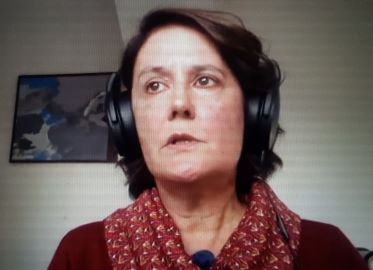
The GLO Virtual Seminar is a monthly internal GLO research event chaired by GLO Director Matloob Piracha and hosted by the GLO partner institution University of Kent. The results are available on the GLO website and the GLO News section, where also the videos of the presentations are posted. All GLO related videos are also available in the GLO YouTube channel. (To subscribe go there.)
The December 2, 2021 seminar in the series was given on London/UK time at 1-2 pm, by Mathilde Maurel (CNRS, FERDI and GLO). See below for a report and the full video of the seminar.


Report
GLO Virtual Seminar on December 2, 2021
Mathilde Maurel (CNRS, FERDI and GLO)
Video of the Seminar.



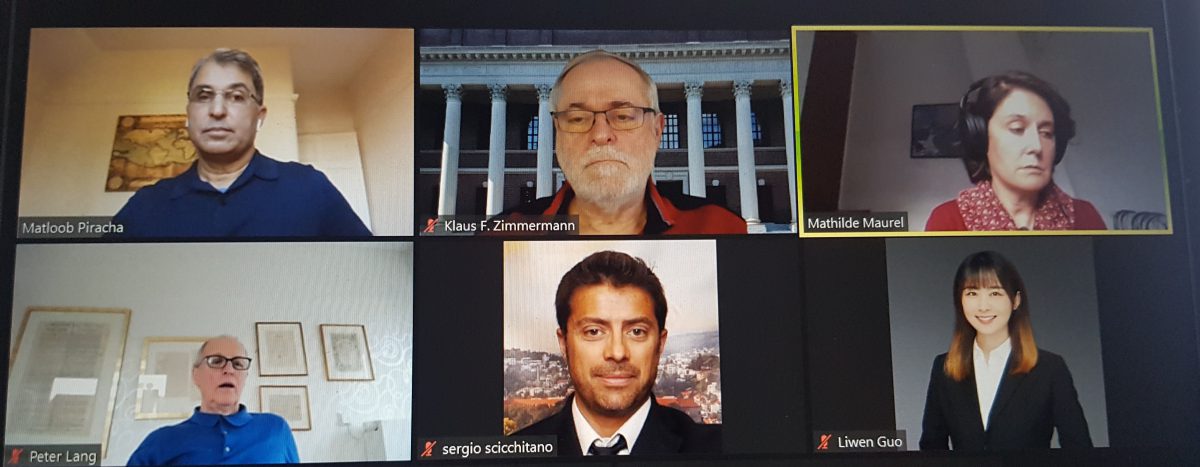
Ends;
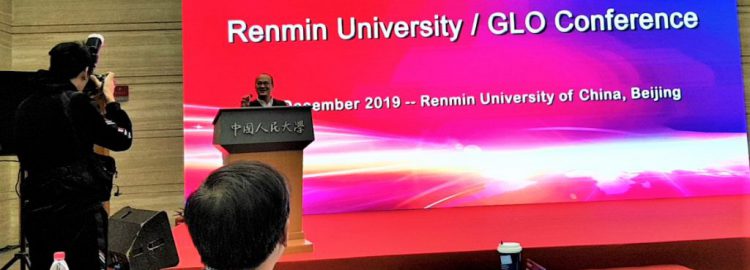
The 4th Renmin University of China, Beijing & GLO Conference 2021 takes place online on December 12, 2021 organized by the School of Labor and Human Resources together with GLO. Topics covered deal with Chinese labor market issues. The event is supported by the Journal of Population Economics.
Organizers: Liqiu Zhao (Renmin University of China and GLO); Corrado Giulietti (University of Southampton and GLO, Associate Editor Journal of Population Economics); Zhong Zhao (Renmin University of China and GLO, Associate Editor Journal of Population Economics).
To participate please register with link:
https://us02web.zoom.us/meeting/register/tZwrc-2hrjooGdIfdPtdnKot4XxIDC8Irc10
The full academic program is provided below.
Papers in the Journal of Population Economics Invited Session can be accessed here:
Just published online first in the Journal of Population Economics:

Ends;

A new GLO Discussion Paper documents causal effects of Chinese import competition for negative health outcomes of individuals working in the German manufacturing sector.

GLO Discussion Paper No. 992, 2021
Trade Shocks, Job Insecurity and Individual Health – Download PDF
by Piriu, Andreea Alexandra
GLO Affiliate Andreea Piriu
Author Abstract: Whether or not immigration negatively affects the labor market outcomes of natives is an ongoing debate. One of the challenges for empirical evidence is the simultaneity of supply- and demand-side effects. To isolate the demand side, we focus on recent refugees in Germany who are exogenously allocated to districts and largely excluded from the labor market. Using panel data of all German districts between 2010 and 2018 and leveraging variation in the local stock of asylum seekers, we find that 1,000 asylum seekers create 267 jobs on average in a district. This growth effect is mainly driven by a demand for additional labor in service, public administration, and social work. As a consequence, we also observe a significant reduction in the local unemployment rate when more refugees arrive. The dynamic panel data estimates are robust to various sensitivity checks and two different instrumental variable approaches. Quantifying the demand side of immigration adds to our understanding of local labor market dynamics in an increasingly mobile world.
Featured image: JR-Korpa-on-Unsplash

GLO Discussion Papers are research and policy papers of the GLO Network which are widely circulated to encourage discussion. Provided in cooperation with EconStor, a service of the ZBW – Leibniz Information Centre for Economics, GLO Discussion Papers are among others listed in RePEc (see IDEAS, EconPapers). Complete list of all GLO DPs – downloadable for free.
The Global Labor Organization (GLO) is an independent, non-partisan and non-governmental organization that functions as an international network and virtual platform to stimulate global research, debate and collaboration.
Ends;

A new GLO Discussion Paper finds that higher obstacles in access to finance reduces employment growth and performance for firms of all sizes.
GLO Discussion Paper No. 991, 2021
Access to finance employment growth and firm performance of South Asia firms – Download PDF
by Bui, Anh Tuan & Pham, Linh Chi & Ta, Thi Khanh Van
GLO Fellow Anh Tuan Bui
Author Abstract: Using firm-level data on 11,000 companies across seven countries in South Asia, this paper explores the effects of access to finance on employment growth and performance at the firm level. The paper focuses on how the impact of financing obstacles varies across firm sizes. The results show that higher obstacles in access to finance reduces employment growth and performance for firms of all sizes, especially micro and small firms. We find significant differences between firms with less than 10 employees and small firm, which suggests that significant reforms are needed to drive micro firm growth to small and medium enterprises.

GLO Discussion Papers are research and policy papers of the GLO Network which are widely circulated to encourage discussion. Provided in cooperation with EconStor, a service of the ZBW – Leibniz Information Centre for Economics, GLO Discussion Papers are among others listed in RePEc (see IDEAS, EconPapers). Complete list of all GLO DPs – downloadable for free.
The Global Labor Organization (GLO) is an independent, non-partisan and non-governmental organization that functions as an international network and virtual platform to stimulate global research, debate and collaboration.
Ends;

The 4th Renmin University of China, Beijing & GLO Conference 2021 takes place online on December 12, 2021 organized by the School of Labor and Human Resources together with GLO. Topics covered deal with Chinese labor market issues. The event is supported by the Journal of Population Economics.
Organizers: Liqiu Zhao (Renmin University of China and GLO); Corrado Giulietti (University of Southampton and GLO, Associate Editor Journal of Population Economics); Zhong Zhao (Renmin University of China and GLO, Associate Editor Journal of Population Economics).
To participate please register with link:
https://us02web.zoom.us/meeting/register/tZwrc-2hrjooGdIfdPtdnKot4XxIDC8Irc10

Ends;
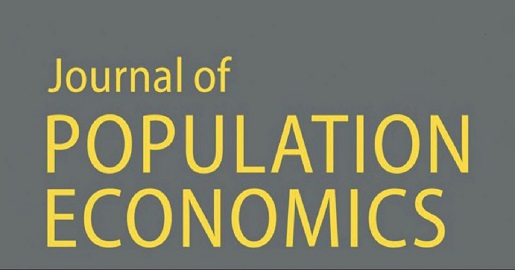
The Journal of Population Economics (JOPE) organizes an event on December 6, 16:00-18:00 CET (Maastricht/Dutch time) to present the Kuznets Prize 2022 and a selection of the Covid-19 articles from issue 34(4)/2021. The event is supported by GLO and hosted by UNU-MERIT via Zoom (see link below).
Managing Editor Michaella Vanore, (UNU-MERIT, Maastricht University, Netherlands, and GLO) will welcome the participants and guide through the event. Editor-in-Chief Klaus F. Zimmermann (UNU-MERIT, Maastricht University, Netherlands, and GLO) will introduce into publishing Covid-19 research with JOPE and present the prize. Editor Terra McKinnish (University of Colorado Boulder, USA, and GLO) and Associate Editor Kompal Sinha (Macquarie University, Sydney, Australia, and GLO) will also attend to chair sessions.
A highlight of the event is the presentation of the Kuznets Prize, which was awarded to
Luca Bonacini, Giovanni Gallo & Sergio Scicchitano
Working from home and income inequality: risks of a ‘new normal’ with COVID-19
Journal of Population Economics 34, 303–360 (2021)
https://doi.org/10.1007/s00148-020-00800-7
Readlink: https://rdcu.be/cCofZ
The authors, Luca Bonacini, Giovanni Gallo & Sergio Scicchitano will be all present in the online ceremony and discuss their work with a panel including Xi Chen (co-author of the Kuznets Prize winning article 2021), Terra McKinnish (JOPE Editor), Kompal Sinha (JOPE Associate Editor) and Klaus F. Zimmermann (JOPE Editor-in-Chief).

The online event will also highlight a selection of the 10 articles published in issue 34(4)/2021 entirely on Covid-19 issues. All articles are published freely accessible and possible to download.
Since the first days of the pandemic, the journal has become a leading outlet for research on the disease by publishing influential articles. JOPE will continue to strengthen this reputation.
Open to the public. Mark your calendars. Detailed program below. The event will be recorded. Please click the link to join the event on December 6, 2021; 16:00-18:00 CET (Maastricht time):
LINK no longer valid. HERE IS THE VIDEO OF THE EVENT.
16:00-16:30
Welcoming Remarks: Michaella Vanore (Managing Editor)
Kuznets Prize 2022: Announcement and presentation: Klaus F. Zimmermann (Editor-in-Chief)
Panel with Luca Bonacini, Giovanni Gallo & Sergio Scicchitano and Xi Chen (co-author of the Kuznets Prize winning article 2021), Terra McKinnish (Editor), Kompal Sinha (Associate Editor).



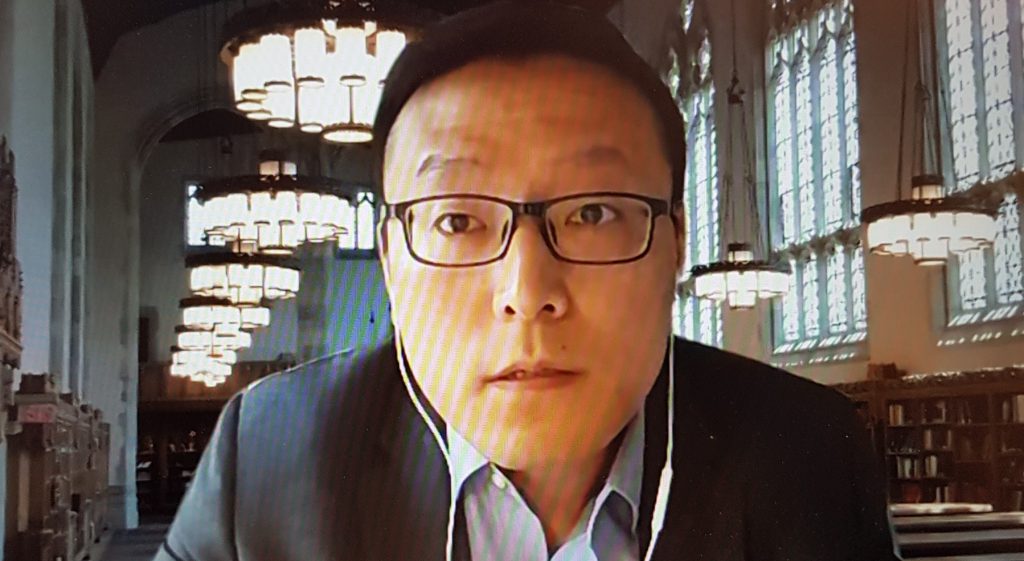

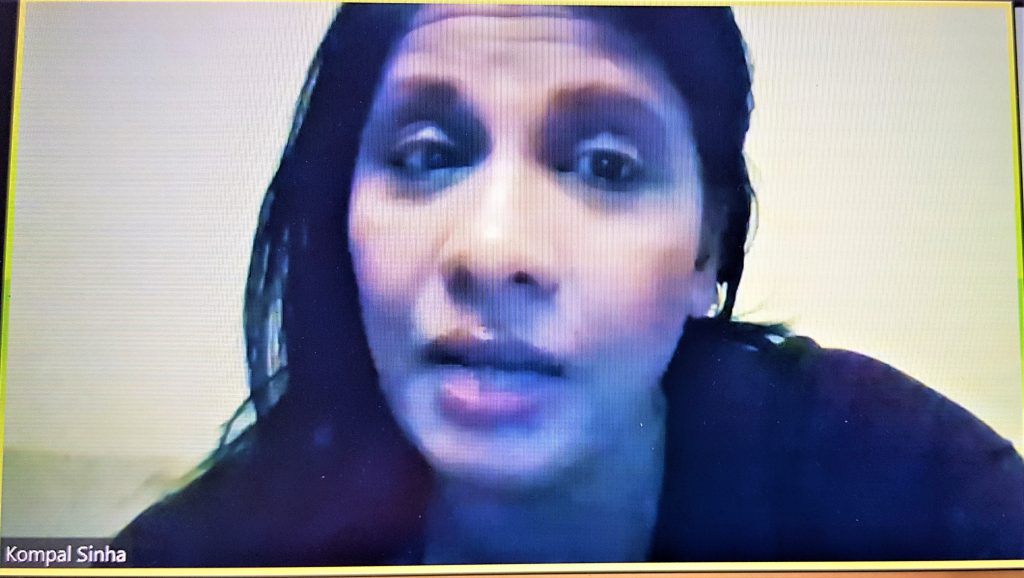

Articles from issue 4/2021:
Session I. (16:30-17:15) Chair: Kompal Sinha (Associate Editor)
Martin Kahanec: The impact of repeated mass antigen testing for COVID-19 on the prevalence of the disease
Daniel Graeber: COVID-19: a crisis of the female self-employed
Augusto Cerqua: Local mortality estimates during the COVID-19 pandemic in Italy
Session II. (17:15-18:00) Chair: Terra McKinnish (Editor)
Lamis Kattan: Stay-at-home orders, social distancing, and trust
Piergiuseppe Fortunato: Coronagraben in Switzerland: culture and social distancing in times of COVID-19
Isaure Delaporte: The distributional consequences of social distancing on poverty and labour income inequality in Latin America and the Caribbean
Volume 34, Issue 4, October 2021 with 10 articles on Covid-19 all freely accessible.
Lead article Issue 3/2021
TOP 5 of Covid-19 papers in the Journal of Population Economics (as of December 5, 2021 ranked according to Google Scholar citations):
1. Qiu, Y., Chen, X. & Shi, W.: Impacts of social and economic factors on the transmission of coronavirus disease 2019 (COVID-19) in China. J Popul Econ 33, 1127–1172 (2020). https://doi.org/10.1007/s00148-020-00778-2
Springer measures: 59k accesses, 148 citations; Google citations: 367
2. Bonacini, L., Gallo, G. & Scicchitano, S.: Working from home and income inequality: risks of a ‘new normal’ with COVID-19. J Popul Econ 34, 303–360 (2021). https://doi.org/10.1007/s00148-020-00800-7
Springer measures: 43k accesses, 51 citations; Google citations: 149
3. Papageorge, N.W., Zahn, M.V., Belot, M. et al.: Socio-demographic factors associated with self-protecting behavior during the Covid-19 pandemic. J Popul Econ 34, 691–738 (2021). https://doi.org/10.1007/s00148-020-00818-x
Springer measures: 14k accesses, 32 citations; Google citations: 130
4. Brodeur, A., Grigoryeva, I. & Kattan, L.: Stay-at-home orders, social distancing, and trust. J Popul Econ 34, 1321–1354 (2021). https://doi.org/10.1007/s00148-021-00848-z
Springer measures: 1.8k accesses, 12 citations; Google citations: 77
5. Milani, F.: COVID-19 outbreak, social response, and early economic effects: a global VAR analysis of cross-country interdependencies. J Popul Econ 34, 223–252 (2021). https://doi.org/10.1007/s00148-020-00792-4
Springer measures: 10k accesses, 33 citations; Google citations: 66
Ends;

A new GLO Discussion Paper explores the impact of financial and legal obstacles utilizing the most recent and unique dataset from the World Bank Enterprise Surveys.
GLO Discussion Paper No. 990, 2021
Financial And Legal Obstacles And Small And Medium Firm Performance: Evidence from Middle Income East Asian – Download PDF
by Bui, Anh Tuan & Pham, Linh Chi & Ta, Thi Khanh Van
GLO Fellow Anh Tuan Bui
Author Abstract: This paper explores the impact of financial and legal obstacles that affect small and medium enterprises (SMEs) in middle-income East Asian countries by utilizing the most recent and unique dataset from the World Bank Enterprise Surveys. We particularly assess whether and at what level the effects on SMEs differ from those on large firms; We also examine how financial and institutional development levels contribute to firm performance. Our findings provide important guidance for regulators, including the authorities of middle-income nations, who seek to facilitate SMEs’ development.

GLO Discussion Papers are research and policy papers of the GLO Network which are widely circulated to encourage discussion. Provided in cooperation with EconStor, a service of the ZBW – Leibniz Information Centre for Economics, GLO Discussion Papers are among others listed in RePEc (see IDEAS, EconPapers). Complete list of all GLO DPs – downloadable for free.
The Global Labor Organization (GLO) is an independent, non-partisan and non-governmental organization that functions as an international network and virtual platform to stimulate global research, debate and collaboration.
Ends;

A new GLO Discussion Paper finds that refugee migration created native jobs and reduce their unemployment in Germany.
GLO Discussion Paper No. 989, 2021
Refugee migration, labor demand, and local employment – Download PDF
by Auer, Daniel & Götz, Lilia
GLO Fellow Daniel Auer
Author Abstract: Whether or not immigration negatively affects the labor market outcomes of natives is an ongoing debate. One of the challenges for empirical evidence is the simultaneity of supply- and demand-side effects. To isolate the demand side, we focus on recent refugees in Germany who are exogenously allocated to districts and largely excluded from the labor market. Using panel data of all German districts between 2010 and 2018 and leveraging variation in the local stock of asylum seekers, we find that 1,000 asylum seekers create 267 jobs on average in a district. This growth effect is mainly driven by a demand for additional labor in service, public administration, and social work. As a consequence, we also observe a significant reduction in the local unemployment rate when more refugees arrive. The dynamic panel data estimates are robust to various sensitivity checks and two different instrumental variable approaches. Quantifying the demand side of immigration adds to our understanding of local labor market dynamics in an increasingly mobile world.
Featured image: Ra-Dragon-on-Unsplash

GLO Discussion Papers are research and policy papers of the GLO Network which are widely circulated to encourage discussion. Provided in cooperation with EconStor, a service of the ZBW – Leibniz Information Centre for Economics, GLO Discussion Papers are among others listed in RePEc (see IDEAS, EconPapers). Complete list of all GLO DPs – downloadable for free.
The Global Labor Organization (GLO) is an independent, non-partisan and non-governmental organization that functions as an international network and virtual platform to stimulate global research, debate and collaboration.
Ends;

A new GLO Discussion Paper provides novel insights into the distributive role of tax-benefit systems.

GLO Discussion Paper No. 988, 2021
Redistribution across Europe: How much and to whom? – Download PDF
by Hammer, Bernhard & Christl, Michael & De Poli, Silvia
GLO Fellow Michael Christl
Author Abstract: Governments face a potential trade-off between provision for the growing population in retirement and the support of working-age households with low income. Using EUROMOD-based microdata from 28 countries, we (a) quantify the redistribution to the pensioner and non-pensioner populations, (b) study the position of net beneficiaries in the overall income distribution and (c) analyse how taxes and benefits affect the working-age population with low income. Our results provide novel insights into the distributive role of tax-benefit systems across Europe. Interestingly, a strong overall redistribution between households is associated with generous pensions for a portion of the retirees but negatively related to support for low-income households.

GLO Discussion Papers are research and policy papers of the GLO Network which are widely circulated to encourage discussion. Provided in cooperation with EconStor, a service of the ZBW – Leibniz Information Centre for Economics, GLO Discussion Papers are among others listed in RePEc (see IDEAS, EconPapers). Complete list of all GLO DPs – downloadable for free.
The Global Labor Organization (GLO) is an independent, non-partisan and non-governmental organization that functions as an international network and virtual platform to stimulate global research, debate and collaboration.
Ends;

The Journal of Population Economics awards annually the Kuznets Prize for the best paper published in the Journal in a particular year. The 2022 Prize based on the articles in 2021 goes to:
Luca Bonacini, Giovanni Gallo & Sergio Scicchitano
Working from home and income inequality: risks of a ‘new normal’ with COVID-19
Journal of Population Economics 34, 303–360 (2021)
https://doi.org/10.1007/s00148-020-00800-7
Readlink: https://rdcu.be/cCofZ
The award ceremony is part of a journal workshop on December 6, 2021. 4-6 pm CEST:
Presentation of Kuznets Prize 2022 & Highlights of JOPE Issue 4/2021 on Covid-19 economics.
MORE information and info to participate: LINK



***
Paper abstract: In the current context of the COVID-19 pandemic, working from home (WFH) became of great importance for a large share of employees since it represents the only option to both continue working and minimize the risk of virus exposure. Uncertainty about the duration of the pandemic and future contagion waves even led companies to view WFH as a ‘new normal’ way of working. Based on influence function regression methods, this paper explores the potential consequences in the labor income distribution related to a long-lasting increase in WFH feasibility among Italian employees. Results show that a positive shift in WFH feasibility would be associated with an increase in average labor income, but this potential benefit would not be equally distributed among employees. Specifically, an increase in the opportunity to WFH would favor male, older, high-educated, and high-paid employees. However, this ‘forced innovation’ would benefit more employees living in provinces have been more affected by the novel coronavirus. WFH thus risks exacerbating pre-existing inequalities in the labor market, especially if it will not be adequately regulated. As a consequence, this study suggests that policies aimed at alleviating inequality, like income support measures (in the short run) and human capital interventions (in the long run), should play a more important compensating role in the future.
Ends;
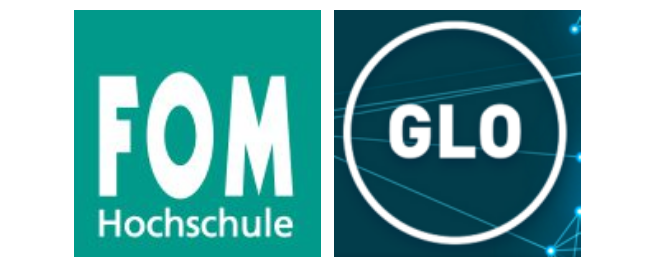
GLO and FOM University of Applied Sciences are strategic partners and institutional supporters. After years of cooperation, representatives have signed a Memorandum of Understanding (MOU) about their successful collaboration on research and educational activities. As the MOU states: “The collaboration aims to advance academic knowledge in both parties through the encouragement of academic research, the communication among scholars through meetings, conferences and seminars, the promotion of publication opportunities and by providing networking opportunities for scholars through events, projects and other joint activities.” The agreement was signed in November 2021 by FOM’s Chancellor Harald Beschorner and GLO President Klaus F. Zimmermann.
Examples of past successful activities:


Ends;

A new GLO Discussion Paper constructs a direct measure of occupational exposure to robotic labour-saving technologies.
GLO Discussion Paper No. 987, 2021
Labour-saving automation and occupational exposure: a text-similarity measure – Download PDF
by Montobbio, Fabio & Staccioli, Jacopo & Virgillito, Maria Enrica & Vivarelli, Marco
GLO Fellows Fabio Montobbio, Jacopo Staccioli, Maria Enrica Virgillito & Marco Vivarelli


Author Abstract: This paper represents one of the first attempts at building a direct measure of occupational exposure to robotic labour-saving technologies. After identifying robotic and LS robotic patents retrieved by Montobbio et al. (2022), the underlying 4-digit CPC definitions are employed in order to detect functions and operations performed by technological artefacts which are more directed to substitute the labour input. This measure allows to obtain fine-grained information on tasks and occupations according to their similarity ranking. Occupational exposure by wage and employment dynamics in the United States is then studied, complemented by investigating industry and geographical penetration rates.
Featured image: Andy-Kelly-on-Unsplash

GLO Discussion Papers are research and policy papers of the GLO Network which are widely circulated to encourage discussion. Provided in cooperation with EconStor, a service of the ZBW – Leibniz Information Centre for Economics, GLO Discussion Papers are among others listed in RePEc (see IDEAS, EconPapers). Complete list of all GLO DPs – downloadable for free.
The Global Labor Organization (GLO) is an independent, non-partisan and non-governmental organization that functions as an international network and virtual platform to stimulate global research, debate and collaboration.
Ends;

The Journal of Population Economics (JOPE) announces an event for December 6, 16:00-18:00 CET (Maastricht/Dutch time) to present the Kuznets Prize 2022 and a selection of the articles from issue 34(4)/2021. The event is supported by GLO and hosted by UNU-MERIT via Zoom. Editor-in-Chief Klaus F. Zimmermann (UNU-MERIT, Maastricht University, Netherlands, and GLO) will welcome the participants and present the prize. Managing Editor Michaella Vanore, (UNU-MERIT, Maastricht University, Netherlands, and GLO) will guide through the event. Editor Terra McKinnish (University of Colorado Boulder, USA, and GLO) and Associate Editor Kompal Sinha (Macquarie University, Sydney, Australia, and GLO) will also attend to chair sessions. This is a unique opportunity to keep contact with fresh research and to meet the researchers behind.

The webinar will highlight a selection of the 10 articles published in issue 34(4)/2021 entirely on Covid-19 issues. All articles are published freely accessible and possible to download.
Since the first days of the pandemic, the journal has become a leading outlet for research on the disease by publishing influential articles. JOPE will continue to strengthen this reputation.
Open to the public. Mark your calendars. Detailed program below. The event will be recorded. Please click the link to join the event on December 6, 2021; 16:00-18:00 CEST: LINK
https://us02web.zoom.us/j/83267591773?pwd=ZkpuSExTTnQ4emZMTC9QTXl3TzQ1dz09
16:00-16:30
Welcoming Remarks: Michaella Vanore (Managing Editor)
Kuznets Prize 2022: Announcement and presentation: Klaus F. Zimmermann (Editor-in-Chief)
Session I. (16:30-17:15) Chair: Kompal Sinha (Associate Editor)
Martin Kahanec: The impact of repeated mass antigen testing for COVID-19 on the prevalence of the disease
Daniel Graeber: COVID-19: a crisis of the female self-employed
Augusto Cerqua: Local mortality estimates during the COVID-19 pandemic in Italy
Session II. (17:15-18:00) Chair: Terra McKinnish (Editor)
Lamis Kattan: Stay-at-home orders, social distancing, and trust
Piergiuseppe Fortunato: Coronagraben in Switzerland: culture and social distancing in times of COVID-19
Isaure Delaporte: The distributional consequences of social distancing on poverty and labour income inequality in Latin America and the Caribbean
Volume 34, Issue 4, October 2021 with 10 articles on Covid-19 all freely accessible.
Lead article Issue 3/2021
TOP 5 of Covid-19 papers in the Journal of Population Economics (as of November 29, 2021):
1. Qiu, Y., Chen, X. & Shi, W.: Impacts of social and economic factors on the transmission of coronavirus disease 2019 (COVID-19) in China. J Popul Econ 33, 1127–1172 (2020). https://doi.org/10.1007/s00148-020-00778-2
Springer measures: 59k accesses, 146 citations; Google citations: 364
2. Bonacini, L., Gallo, G. & Scicchitano, S.: Working from home and income inequality: risks of a ‘new normal’ with COVID-19. J Popul Econ 34, 303–360 (2021). https://doi.org/10.1007/s00148-020-00800-7
Springer measures: 42k accesses, 46 citations; Google citations: 146
3. Milani, F.: COVID-19 outbreak, social response, and early economic effects: a global VAR analysis of cross-country interdependencies. J Popul Econ 34, 223–252 (2021). https://doi.org/10.1007/s00148-020-00792-4
Springer measures: 10k accesses, 33 citations; Google citations: 66
4. Papageorge, N.W., Zahn, M.V., Belot, M. et al.: Socio-demographic factors associated with self-protecting behavior during the Covid-19 pandemic. J Popul Econ 34, 691–738 (2021). https://doi.org/10.1007/s00148-020-00818-x
Springer measures: 13k accesses, 32 citations; Google citations: 128
5. Bonacini, L., Gallo, G. & Patriarca, F.: Identifying policy challenges of COVID-19 in hardly reliable data and judging the success of lockdown measures. J Popul Econ 34, 275–301 (2021). https://doi.org/10.1007/s00148-020-00799-x
Springer measures: 4.8k accesses, 27 citations; Google citations: 46
Ends;

A new GLO Discussion Paper finds that initially authoritarian countries are slow in the vaccination process, while education is most relevant for scaling up the campaign and financial strength of the economies drive them to higher vaccination rates.
GLO Discussion Paper No. 986, 2021
How education and GDP drive the COVID-19 vaccination campaign – Download PDF
by Ngo, Vu M. & Zimmermann, Klaus F. & Nguyen, Phuc V. & Huynh, Toan L.D. & Nguyen, Huan H.
GLO Fellows Vu Ngo, Toan Luu Duc Huynh, Huan Huu Nguyen, GLO Affiliate Phuc Nguyen and GLO President Klaus F. Zimmermann




Author Abstract: Since vaccination is the decisive factor for controlling the COVID-19 pandemic, it is important to understand the process to vaccination success. We identify a variety of factors playing a crucial role including the availability of vaccines, pandemic pressures, economic strength (GDP), educational development and political regimes. Examining the speed of vaccinations across countries, we find that initially authoritarian countries are slow in the vaccination process, while education is most relevant for scaling up the campaign and financial strength of the economies drive them to higher vaccination rates.
Featured image: Markus-Spiske-on-Unsplash
Further research on the pandemic:
MORE from the GLO Coronavirus Cluster: LINK

GLO Discussion Papers are research and policy papers of the GLO Network which are widely circulated to encourage discussion. Provided in cooperation with EconStor, a service of the ZBW – Leibniz Information Centre for Economics, GLO Discussion Papers are among others listed in RePEc (see IDEAS, EconPapers). Complete list of all GLO DPs – downloadable for free.
The Global Labor Organization (GLO) is an independent, non-partisan and non-governmental organization that functions as an international network and virtual platform to stimulate global research, debate and collaboration.
Ends;

A new GLO Discussion Paper finds that a school reform in Hungary increasing the length of schooling did not decrease the probability of dropping out of secondary school at all levels.
GLO Discussion Paper No. 985, 2021
Is raising the school leaving age enough to decrease dropping out? – Download PDF
by Adamecz-Völgyi, Anna
GLO Fellow Anna Adamecz-Völgyi
Author Abstract: This paper examines the effects of increasing the compulsory school leaving age from 16 to 18 in Hungary using a difference-in-regression-discontinuities design identification strategy. While the reform increased the length of schooling, it did not decrease the probability of dropping out of secondary school, either on average or among the most at-risk group of Roma ethnic minority young people. Due to grade retentions, marginal students were older than their peers and couldn’t have made it to the final grade of secondary school by age 18. Neither did the reform increase the probability of employment at age 20 and 25. I show descriptive evidence that the share of disadvantaged students increased heavily in vocational training schools -that most marginal students attended- and potentially crowded out resources. This mechanism raises concerns about using school leaving age reforms as instrumental variables for education as it may violate its monotonicity assumption.

GLO Discussion Papers are research and policy papers of the GLO Network which are widely circulated to encourage discussion. Provided in cooperation with EconStor, a service of the ZBW – Leibniz Information Centre for Economics, GLO Discussion Papers are among others listed in RePEc (see IDEAS, EconPapers). Complete list of all GLO DPs – downloadable for free.
The Global Labor Organization (GLO) is an independent, non-partisan and non-governmental organization that functions as an international network and virtual platform to stimulate global research, debate and collaboration.
Ends;

A new GLO Discussion Paper finds that restricting family allowance eligibility criteria decreases fertility and increases both male and female labor supply.
GLO Discussion Paper No. 984, 2021
Fertility, Family Policy, and Labor Supply: Quasi-Experimental Evidence from France – Download PDF
by Elmallakh, Nelly
GLO Fellow Nelly El-Mallakh
Author Abstract: This paper examines fertility and labor supply responses to a French policy reform that consisted in conditioning the amount of child allowances on household income. Relying on Regression Discontinuity Design and administrative income data, the paper finds that restricting family allowance eligibility criteria decreases fertility. The results also highlight that receiving half the amount of the allowances or not receiving any leads to an increase in both male and female labor supply. Auxiliary regressions show that at least part of the decline in fertility is due to timing effects, as the fertility impact declines as women’s age increases.
Featured image: jude-beck-unsplash

GLO Discussion Papers are research and policy papers of the GLO Network which are widely circulated to encourage discussion. Provided in cooperation with EconStor, a service of the ZBW – Leibniz Information Centre for Economics, GLO Discussion Papers are among others listed in RePEc (see IDEAS, EconPapers). Complete list of all GLO DPs – downloadable for free.
The Global Labor Organization (GLO) is an independent, non-partisan and non-governmental organization that functions as an international network and virtual platform to stimulate global research, debate and collaboration.
Ends;

The GLO Virtual Seminar is a monthly internal GLO research event chaired by GLO Director Matloob Piracha and hosted by the GLO partner institution University of Kent. The results are available on the GLO website and the GLO News section, where also the videos of the presentations are posted. All GLO related videos are also available in the GLO YouTube channel. (To subscribe go there.)
Forthcoming (GLO members & special invitations):
December 2, 2021; 1 pm London/UK time: Mathilde Maurel (CNRS, FERDI and GLO
A new approach for evaluation of the economic impact of decentralized electrification projects (with J.C. Berthélémy)
The November 2, 2021 seminar in the series was given on London/UK time at 1-2 pm, by Karin Mayr-Dorn (University of Linz and GLO). See below for a report and the full video of the seminar.
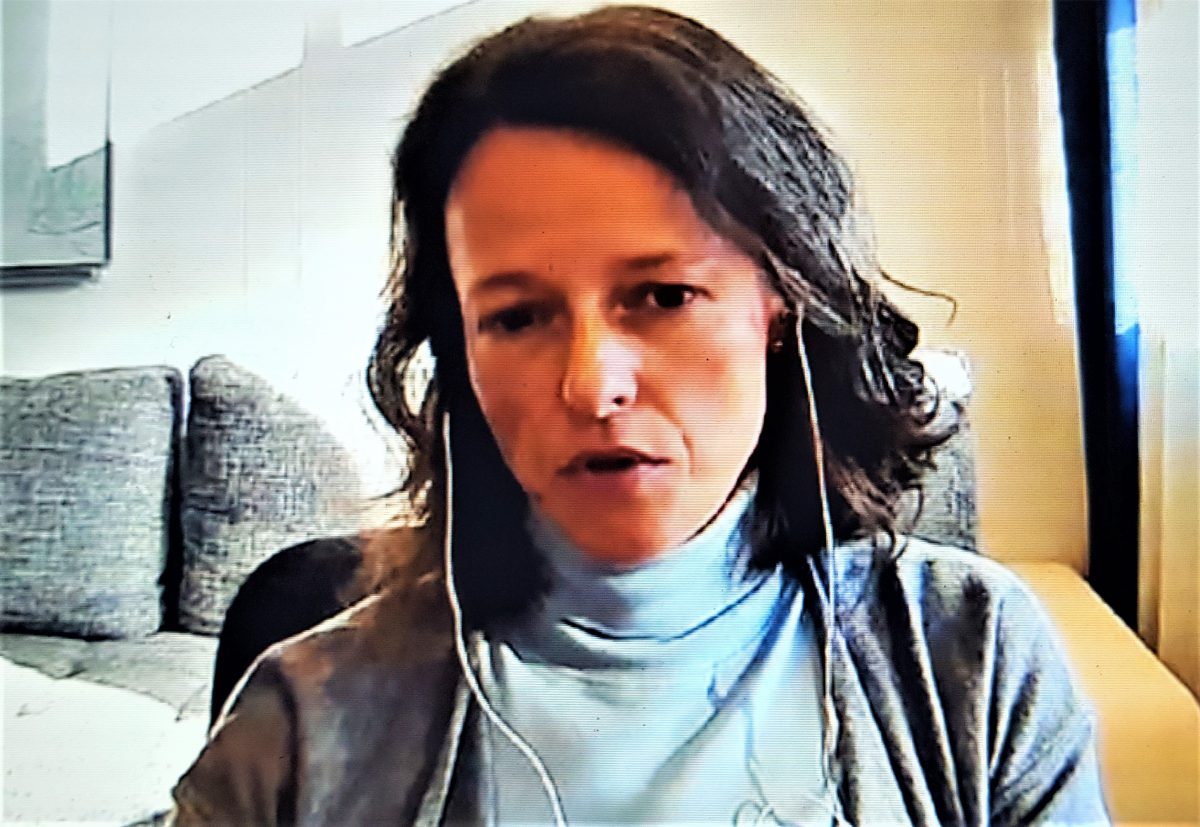

Report
GLO Virtual Seminar on November 4, 2021
Karin Mayr-Dorn (University of Linz and GLO)
Video of the Seminar.


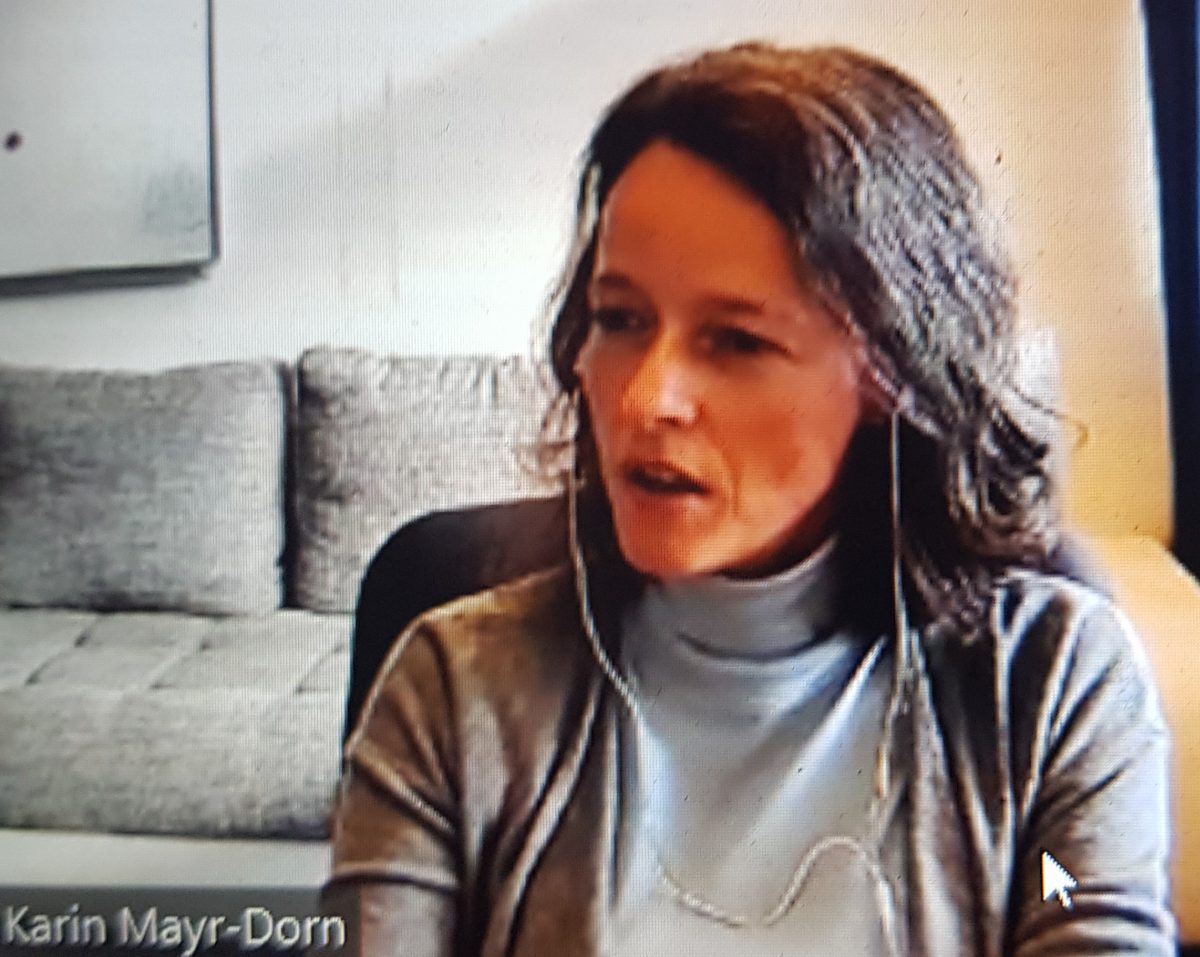
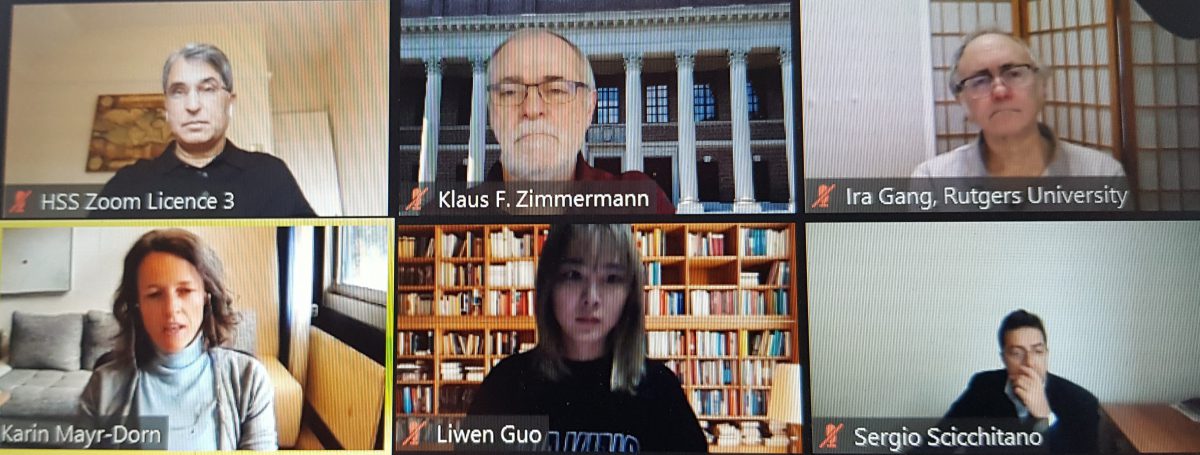



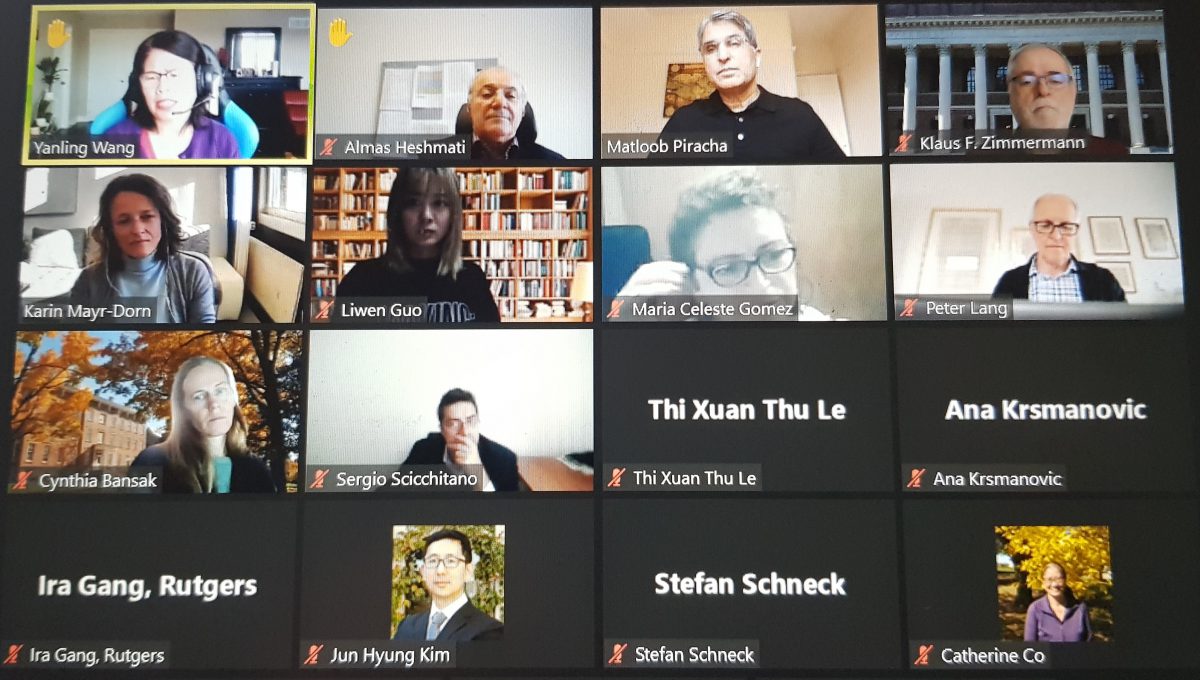
Ends;

A new GLO Discussion Paper studies how institutional quality affects the size of the informal economy to find a positive and a significant association between labor productivity and the size of the shadow economy, among others.
GLO Discussion Paper No. 983, 2021
Vicious Circle or New Paradigm? Exploring the Impact of Shadow Economy on Labour Market in Latin America and Eurozone – Download PDF
by Khorana, Sangeeta & Caram, Santiago & Biagetti, Marco
GLO Fellow Sangeeta Khorana & GLO Affiliate Marco Biagetti

Author Abstract: The relationship between shadow economy (or informal economy) and development has been extensively researched. But there is a lack of consensus on how institutional quality affects the size of informal economy in any country. Using the Kuznets Curve hypothesis we assess the relationship between institutional quality and the size of SE for a group of Latin American and Eurozone countries for 1991-2015. We examine the rationale of the ‘exclusion’ and ‘escape’ theories in short and long-run with the multiple indicators multiple causes (MIMIC) model. We use two techniques, namely an instrumental variable (IV) and Fully Modified OLS (FMOLS) approach. The results show positive and a significant relationship between labour productivity and the size of the shadow economy. We also find that the size of the informal sector is related to the institutional framework, and while the size of the informal sector varies across countries, both formal and informal sectors can co-exist in the long run. High corruption together with an excessive tax burden and adverse socio-economic conditions impact the size of the informal sector in an economy.
Featured image: JR-Korpa-on-Unsplash

GLO Discussion Papers are research and policy papers of the GLO Network which are widely circulated to encourage discussion. Provided in cooperation with EconStor, a service of the ZBW – Leibniz Information Centre for Economics, GLO Discussion Papers are among others listed in RePEc (see IDEAS, EconPapers). Complete list of all GLO DPs – downloadable for free.
The Global Labor Organization (GLO) is an independent, non-partisan and non-governmental organization that functions as an international network and virtual platform to stimulate global research, debate and collaboration.
Ends;

A new GLO Discussion Paper finds that multitasking does not work out for students.

GLO Discussion Paper No. 982, 2021
Does Multitasking Affect Students’ Academic Performance? Evidence From a Longitudinal Study – Download PDF
by Amez, Simon & Baert, Stijn & Heydencamp, Emily & Wuyts, Joey
GLO Fellow Stijn Baert
Author Abstract: Multitasking – alternating between two different tasks at the same time – has become a daily habit for many university students. However, this may come at a cost since the existing literature emphasises the negative association between multitasking and academic performance. Nonetheless, this literature is based on cross-sectional observational data so that that estimates cannot be given a causal interpretation. To complement these studies, we opted for a longitudinal design in this study. Specifically, for three consecutive years, students at two Belgian universities, in more than ten different study programmes, were surveyed on their multitasking preferences and academic performance. Then, these results were merged with the students’ exam scores. We exploited the longitudinal character of the data by running random and fixed effect models. Our results indicate that the positive and negative aspects of multitasking with respect to academic performance cancel each other out.
Featured image: j-zamora-on-unsplash

GLO Discussion Papers are research and policy papers of the GLO Network which are widely circulated to encourage discussion. Provided in cooperation with EconStor, a service of the ZBW – Leibniz Information Centre for Economics, GLO Discussion Papers are among others listed in RePEc (see IDEAS, EconPapers). Complete list of all GLO DPs – downloadable for free.
The Global Labor Organization (GLO) is an independent, non-partisan and non-governmental organization that functions as an international network and virtual platform to stimulate global research, debate and collaboration.
Ends;

Personnel news of the Journal of Population Economics (JOPE):


Welcome to new JOPE Associate Editors:



Ends;

A new GLO Discussion Paper finds that periods ahead of an unemployment event, health outcomes decline and unmet needs for medical care increase.

GLO Discussion Paper No. 981, 2021
Unemployment and health: a panel event study – Download PDF
by Raftopoulou, Athina & Giannakopoulos, Nicholas
GLO Fellow Nicholas Giannakopoulos
Author Abstract: Adopting a panel event study framework, we estimate the effect of unemployment on health outcomes by exploiting the variation in the timing of entering unemployment using longitudinal data for Greece. We find, that in the periods ahead of an unemployment event, health outcomes decline and unmet needs for medical care increase. These findings are valid only for men and are robust to alternative definitions of health outcomes, unemployment events and model specifications.

GLO Discussion Papers are research and policy papers of the GLO Network which are widely circulated to encourage discussion. Provided in cooperation with EconStor, a service of the ZBW – Leibniz Information Centre for Economics, GLO Discussion Papers are among others listed in RePEc (see IDEAS, EconPapers). Complete list of all GLO DPs – downloadable for free.
The Global Labor Organization (GLO) is an independent, non-partisan and non-governmental organization that functions as an international network and virtual platform to stimulate global research, debate and collaboration.
Ends;

A new GLO Discussion Paper extract verbs and nouns in text data to measure social, technical and basic skills in a novel way.
GLO Discussion Paper No. 979, 2021
Learning the Right Skill: The Returns to Social, Technical and Basic Skills for Middle-Educated Graduates – Download PDF
by Cnossen, Femke & Piracha, Matloob & Tchuente, Guy
GLO Fellows Femke Cnossen and Guy Tchuente & GLO Director Matloob Piracha



Author Abstract: Technological change and globalization have sparked debates on the changing demand for skills in western labour markets, especially for middle skilled workers who have seen their tasks replaced. This paper provides a new data set, which is based on text data from curricula of the entire Dutch vocational education system. We extract verbs and nouns to measure social, technical and basic skills in a novel way. This method allows us to uncover the skills middle-skilled students learn in school. Using this data, we show that skill returns vary across students specialized in STEM, economics or health, as well as across sectors of employment.

GLO Discussion Papers are research and policy papers of the GLO Network which are widely circulated to encourage discussion. Provided in cooperation with EconStor, a service of the ZBW – Leibniz Information Centre for Economics, GLO Discussion Papers are among others listed in RePEc (see IDEAS, EconPapers). Complete list of all GLO DPs – downloadable for free.
The Global Labor Organization (GLO) is an independent, non-partisan and non-governmental organization that functions as an international network and virtual platform to stimulate global research, debate and collaboration.
Ends;

A new GLO Discussion Paper finds that exposure to role models increases high ability female students’ preferences for engineering programs.
GLO Discussion Paper No. 975, 2021
Women in Engineering: The Role of Role Models – Download PDF
by Agurto, M. & Bazan, M. & Hari, S. & Sarangi, S
GLO Fellows Muchin Isabel Bazan Ruiz and Sudipta Sarangi


Author Abstract: Gender disparities in STEM fields participation are a major cause of concern for policymakers around the world. In addition to talent misallocation, low female enrollment rates in STEM careers contribute to gender-based inequalities in earnings and wealth, given the higher average level of earnings in these fields. This paper studies the effects of exposure to role models on female preferences for STEM majors. We conduct a randomized control trial where female senior students currently enrolled in engineering programs at an elite private university in Peru give talks about their experiences at randomly selected high schools. We find that exposure to this treatment increases high ability female students’ preferences for engineering programs by 14 percentage points. The effect is only statistically significant for the subgroup of female students with baseline math scores in the top 25 percentile, and who reside close to the city where the role models’ university is located. We also find positive but smaller effects on “low ability” male students. In a context where females are discouraged from enrolling in STEM fields, our results have important policy implications.

GLO Discussion Papers are research and policy papers of the GLO Network which are widely circulated to encourage discussion. Provided in cooperation with EconStor, a service of the ZBW – Leibniz Information Centre for Economics, GLO Discussion Papers are among others listed in RePEc (see IDEAS, EconPapers). Complete list of all GLO DPs – downloadable for free.
The Global Labor Organization (GLO) is an independent, non-partisan and non-governmental organization that functions as an international network and virtual platform to stimulate global research, debate and collaboration.
Ends;

The 4th Renmin University of China & GLO Conference 2021 takes place online in Beijing on December 12 organized by the School of Labor and Human Resources together with GLO. Topics covered will deal with Chinese labor market issues.
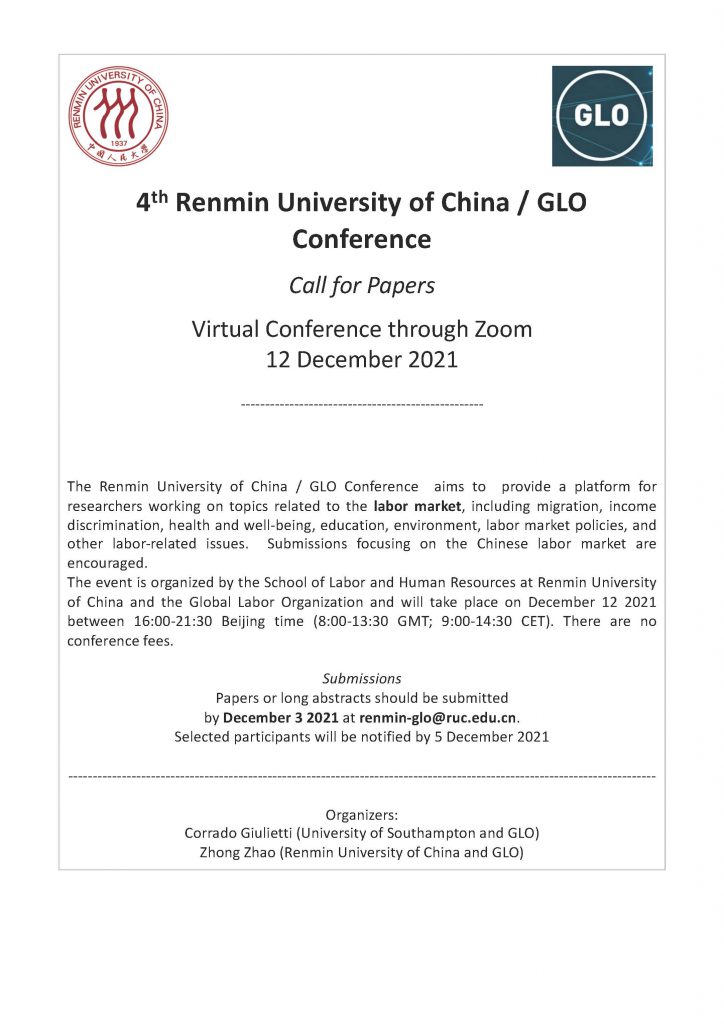
Ends;

A new GLO Discussion Paper evaluates research to find that LGBT inclusion and positive economic outcomes mutually reinforced each other.

GLO Discussion Paper No. 980, 2021
The Economics of Being LGBT. A Review: 2015-2020 – Download PDF
by Drydakis, Nick
GLO Fellow Nick Drydakis
Author Abstract: This paper reviews studies on LGBT workplace outcomes published between 2015 and 2020. In terms of earnings differences, in the US, Canada, Europe, and Australia, gay men were found to experience earnings penalties of 7% in comparison to heterosexual men, bisexual men experienced earnings penalties of 9% in comparison to heterosexual men, and bisexual women faced earnings penalties of 5% in comparison to heterosexual women. In the same regions, lesbian women experienced an earnings premium of 7% in comparison to heterosexual women. Trans women, in the US and Europe, faced earnings penalties ranging from 4% to 20%. In terms of job satisfaction, in the US, Canada, and Europe, gay men, and lesbian women experienced 15% and 12%, respectively lower job satisfaction than their heterosexual counterparts. Additionally, bullying against sexual minorities has persisted. In the UK, sexual minorities who experienced frequent school-age bullying faced a 32% chance of experiencing frequent workplace bullying. In relation to job exclusions, in OECD countries, gay men and lesbian women were found to experience 39% and 32%, respectively lower access to occupations than comparable heterosexual men and women. For trans men and women in Europe, comparable patterns are in evidence. Given these patterns, it is not of surprise that LGBT people in the US and the UK experience higher poverty rates than heterosexual and cis people. However, in these two regions, anti-discrimination laws and positive actions in the workplace helped reduce the earnings penalties for gay men, enhance trans people’s self-esteem, spur innovation and firms’ performance, and boost marketing capability, corporate profiles, and customer satisfaction. The evidence indicated that LGBT inclusion and positive economic outcomes mutually reinforced each other.
Featured image: Steve-Johnson-Unsplash

GLO Discussion Papers are research and policy papers of the GLO Network which are widely circulated to encourage discussion. Provided in cooperation with EconStor, a service of the ZBW – Leibniz Information Centre for Economics, GLO Discussion Papers are among others listed in RePEc (see IDEAS, EconPapers). Complete list of all GLO DPs – downloadable for free.
The Global Labor Organization (GLO) is an independent, non-partisan and non-governmental organization that functions as an international network and virtual platform to stimulate global research, debate and collaboration.
Ends;

A new GLO Discussion Paper documents the size and consequences of worker misallocations into jobs.

GLO Discussion Paper No. 976, 2021
“Are you in the right job?” Human Capital Mismatch in the UK – Download PDF
by Galanakis, Yannis
GLO Fellow Yannis Galanakis
Author Abstract: This paper examines a problem of worker misallocation into jobs. A theoretical model, allowing for heterogeneous workers and firms, shows that job search frictions generate mismatch between employees and employers. In the empirical analysis, the British Household Panel Survey (BHPS), the UK household Longitudinal Study (UKHLS) and British Cohort Study 1970 (BCS70) data are used to measure the incidence of mismatch, how it changes over time and whether it can be explained by unobserved ability. Results show that (i) the incidence of mismatch increases after the Great Recession. (ii) Individual transitions to/from matching take place due to workers’ occupational mobility and over-time skills development. (iii) Employees can find better jobs or their mobility occurs earlier than the aggregate change of skills. (iv) Controlling for individual heterogeneity, measured by cognitive and non-cognitive skill test scores throughout childhood, does not decrease the incidence of mismatch. This suggests that unobserved productivity does not generate mismatch in the labour market.
Featured image: tim-gouw-on-unsplash

GLO Discussion Papers are research and policy papers of the GLO Network which are widely circulated to encourage discussion. Provided in cooperation with EconStor, a service of the ZBW – Leibniz Information Centre for Economics, GLO Discussion Papers are among others listed in RePEc (see IDEAS, EconPapers). Complete list of all GLO DPs – downloadable for free.
The Global Labor Organization (GLO) is an independent, non-partisan and non-governmental organization that functions as an international network and virtual platform to stimulate global research, debate and collaboration.
Ends;

A new GLO Discussion Paper finds that education played a protective role, significantly reducing mortality rates, during the first wave of the pandemic (between March and May 2020), but not during the second wave (between October and December 2020).

GLO Discussion Paper No. 978, 2021
Education and COVID-19 excess mortality – Download PDF
by Bello, Piera & Rocco, Lorenzo
GLO Fellow Lorenzo Rocco
Author Abstract: We study the role of education during the COVID-19 epidemic in Italy. We compare the trends of mortality rates between municipalities with different shares of educated residents between 2012 and 2020, by means of a continuous event study model and controlling for many confounders. We find that education played a protective role, significantly reducing mortality rates, during the first wave of the pandemic (between March and May 2020), but not during the second wave (between October and December 2020). We tentatively interpret this finding as the outcome of the interplay between education and public health communication, whose coherence and consistency varied between the different stages of the epidemic.
Featured image: fusion-medical-animation-unsplash

GLO Discussion Papers are research and policy papers of the GLO Network which are widely circulated to encourage discussion. Provided in cooperation with EconStor, a service of the ZBW – Leibniz Information Centre for Economics, GLO Discussion Papers are among others listed in RePEc (see IDEAS, EconPapers). Complete list of all GLO DPs – downloadable for free.
The Global Labor Organization (GLO) is an independent, non-partisan and non-governmental organization that functions as an international network and virtual platform to stimulate global research, debate and collaboration.
Ends;

A new GLO Discussion Paper shows that women appear to be more sensitive to the effect of the pandemic, and report much higher levels of anxiety and depression than males.

GLO Discussion Paper No. 977, 2021
The Effect of Repeated Lockdowns during the Covid-19 Pandemic on UK Mental Health Outcomes – Download PDF
by Lindley, Joanne & Rienzo, Cinzia
GLO Fellow Cinzia Rienzo
Author Abstract: This paper assesses the impact of the Covid-19 lockdown measures on the mental health of individuals in the UK, starting from the early restrictions in April 2020, and covering three subsequent lockdowns, up until March 2021. It also considers three aspects of mental health; that is ‘anxiety and depression’, ‘social dysfunction’, and ‘loss of confidence’, in order to identify which specific dimensions of respondents’ psychology have been adversely affected. Our findings show that women appear to be more sensitive to the effect of the pandemic, and report much higher levels of anxiety and depression than males; whilst social dysfunction appears to be a more permanent fixture. Initially, social dysfunction was higher for women and younger workers, but it remained high for women and the over 55s. Consequently, our evidence supports targeted policies aimed at reducing social isolation for women and older workers. Finally, we show that financial difficulties had a growing impact on all mental health outcomes, as the pandemic progressed.
Featured image: Photo-by-Adli-Wahid-on-Unsplash

GLO Discussion Papers are research and policy papers of the GLO Network which are widely circulated to encourage discussion. Provided in cooperation with EconStor, a service of the ZBW – Leibniz Information Centre for Economics, GLO Discussion Papers are among others listed in RePEc (see IDEAS, EconPapers). Complete list of all GLO DPs – downloadable for free.
The Global Labor Organization (GLO) is an independent, non-partisan and non-governmental organization that functions as an international network and virtual platform to stimulate global research, debate and collaboration.
Ends;

A new GLO Discussion Paper finds small but statistically significant detrimental effects on labor market outcomes of Vietnam veterans residing in unauthorized Chinese enclaves in 1990.

GLO Discussion Paper No. 974, 2021
Trade Networks, Heroin Markets, and the Labor Market Outcomes of Vietnam Veterans – Download PDF
by Lonsky, Jakub & Ruiz, Isabel & Vargas-Silva, Carlos
GLO Fellows Jakub Lonsky, Isabel Ruiz & Carlos Vargas-Silva
Author Abstract: The role of ethnic immigrant networks in facilitating international trade is a well-established phenomenon in the literature. However, it is less clear whether this relationship extends to illegal trade and unauthorized immigrants. In this paper, we tackle this question by focusing on the case of the heroin trade and unauthorized Chinese immigrants in the early 1990s United States. Between mid-1980s and mid-1990s, Southeast Asia became the dominant source of heroin in the US. Heroin from this region was trafficked into the US by Chinese organized criminals, whose presence across the country can be approximated by the location of unauthorized Chinese immigrants. Instrumenting for the unauthorized Chinese immigrant enclaves in 1990 with their 1900 counterpart, we first show that Chinese presence in a community led to a sizeable increase in local opiates-related arrests, a proxy for local heroin markets. This effect is driven by arrests for sale/manufacturing of the drugs. Next, we examine the consequences of Chinese-trafficked heroin by looking at its impact on US Vietnam-era veterans – a group particularly vulnerable to heroin addiction in the early 1990s. Using a triple-difference estimation, we find mostly small but statistically significant detrimental effects on labor market outcomes of Vietnam veterans residing in unauthorized Chinese enclaves in 1990.
Featured image: Tim Cooper on Unsplash

GLO Discussion Papers are research and policy papers of the GLO Network which are widely circulated to encourage discussion. Provided in cooperation with EconStor, a service of the ZBW – Leibniz Information Centre for Economics, GLO Discussion Papers are among others listed in RePEc (see IDEAS, EconPapers). Complete list of all GLO DPs – downloadable for free.
The Global Labor Organization (GLO) is an independent, non-partisan and non-governmental organization that functions as an international network and virtual platform to stimulate global research, debate and collaboration.
Ends;

A new GLO Discussion Paper finds for Turkey that increasing the minimum wage reduces the employment probability of young males first but school enrollment increases over time and absorbs the negative employment effect.

GLO Discussion Paper No. 973, 2021
The impact of age-specific minimum wages on youth employment and education: A regression discontinuity analysis – Download PDF
by Dayioglu, Meltem & Kucukbayrak, Muserref & Tumen, Semih
GLO Fellow Semih Tumen
Author Abstract: We exploit an age-specific minimum wage rule – which sets a lower minimum wage for workers of age 15 than the adult minimum wage paid to workers of age 16 and above – and its abolition to estimate the causal effect of a minimum wage increase on youth employment and education in Turkey. Using a regression discontinuity design in tandem with a difference-in-discontinuities analysis, we find that increasing the minimum wage reduces the employment probability of young males by 2.5-3.1 percentage points. We also document that, initially, the minimum wage increase does not lead to a major change in high school enrollment, while the likelihood of transitioning into “neither in employment nor in education and training” (NEET) category notably increases. However, in the medium term, the NEET effect is transitory; school enrollment increases over time and absorbs the negative employment effect. We argue that policy effects have mostly been driven by demand-side forces rather than supply side.

GLO Discussion Papers are research and policy papers of the GLO Network which are widely circulated to encourage discussion. Provided in cooperation with EconStor, a service of the ZBW – Leibniz Information Centre for Economics, GLO Discussion Papers are among others listed in RePEc (see IDEAS, EconPapers). Complete list of all GLO DPs – downloadable for free.
The Global Labor Organization (GLO) is an independent, non-partisan and non-governmental organization that functions as an international network and virtual platform to stimulate global research, debate and collaboration.
Ends;

A new GLO Discussion Paper finds that hiring discrimination against candidates with disabilities, older candidates, and less physically attractive candidates is at least equally severe as the unequal treatment of candidates with salient racial or ethnic characteristics.

GLO Discussion Paper No. 972, 2021
The state of hiring discrimination: A meta-analysis of (almost) all recent correspondence experiments – Download PDF
by Lippens, Louis & Vermeiren, Siel & Baert, Stijn
GLO Fellow Stijn Baert
Author Abstract: Notwithstanding the improved integration of various minority groups in the workforce, unequal treatment in hiring still hinders many individuals’ access to the labour market. To tackle this inaccessibility, it is essential to know which and to what extent minority groups face hiring discrimination. Past meta-studies have charted parts of the discrimination literature but permit only limited comparisons across minority groups. This meta-analysis synthesises a quasi-exhaustive register of correspondence experiments on hiring discrimination published between 2005 and 2020. Using a random-effects model, we computed pooled discrimination ratios concerning a total of ten discrimination grounds upon which unequal treatment in hiring is forbidden under United States federal or state law. First, we find that hiring discrimination against candidates with disabilities, older candidates, and less physically attractive candidates is at least equally severe as the unequal treatment of candidates with salient racial or ethnic characteristics. Remarkably, hiring discrimination against older applicants is even higher in Europe than in the United States. Furthermore, unequal treatment in hiring based on sexual orientation seems to be prompted mainly by signalling activism through an affiliation with an LGB+ rights organisation rather than same-sex orientation in itself. Last, hiring discrimination remains pervasive. Aside from a decrease in hiring discrimination based on race and national origin in Europe, we find no structural evidence of temporal changes in hiring discrimination based on the various other grounds within the scope of this review.
Featured image: Clem Onojeghuo on unsplash

GLO Discussion Papers are research and policy papers of the GLO Network which are widely circulated to encourage discussion. Provided in cooperation with EconStor, a service of the ZBW – Leibniz Information Centre for Economics, GLO Discussion Papers are among others listed in RePEc (see IDEAS, EconPapers). Complete list of all GLO DPs – downloadable for free.
The Global Labor Organization (GLO) is an independent, non-partisan and non-governmental organization that functions as an international network and virtual platform to stimulate global research, debate and collaboration.
Ends;
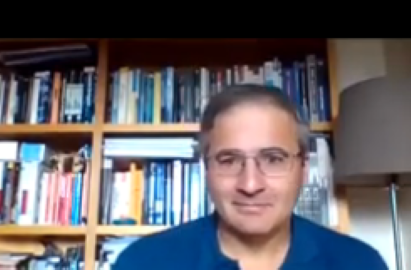
A new GLO Discussion Paper finds that a small number of occupations are responsible for a large share of registrations.

GLO Discussion Paper No. 971, 2021
Which Occupations Do Jobseekers and Firms Look For? Evidence from Three Public Employment Services – Download PDF
by Martins, Pedro S.
GLO Fellow Pedro Martins
Author Abstract: This study proposes and applies a new methodology to analyse firms’ and workers’ occupational preferences. We use microdata covering all 2014-2018 vacancy and jobseeker registrations from the Public Employment Services of Belgium, Morocco, and South Korea. We find that a small number of occupations are responsible for a large share of registrations and may thus deserve particular attention. We also find considerable stability in occupation preferences (especially by jobseekers) but that the correlation between firms’ and workers’ preferences weakens over time. Finally, we find different responsiveness levels of jobseeker preferences to vacancy gaps. However, young jobseekers do not appear to respond more quickly to such gaps.

GLO Discussion Papers are research and policy papers of the GLO Network which are widely circulated to encourage discussion. Provided in cooperation with EconStor, a service of the ZBW – Leibniz Information Centre for Economics, GLO Discussion Papers are among others listed in RePEc (see IDEAS, EconPapers). Complete list of all GLO DPs – downloadable for free.
The Global Labor Organization (GLO) is an independent, non-partisan and non-governmental organization that functions as an international network and virtual platform to stimulate global research, debate and collaboration.
Ends;

A new GLO Discussion Paper reviews the consequences of telework for households.
GLO Discussion Paper No. 970, 2021
Telework and Time Use – Download PDF
by Pabilonia, Sabrina Wulff & Vernon, Victoria
GLO Fellows Sabrina Pabilonia & Victoria Vernon


Author Abstract: This chapter reviews the evidence on the relationship between telework and households’ time allocation, drawing heavily on the empirical evidence from time diary data, and discusses the implications of telework for workers’ productivity, wages, labor force participation, and well-being as well as its impacts on traffic congestion and greenhouse gas emissions. Telework results in significant time savings for workers, as they reduce time on commuting and grooming activities by over one hour on telework days. This time is reallocated to household and leisure activities, but differentially for men and women. Men spend most of their time windfall on leisure activities; however, fathers also increase time on primary child care. Women, on the other hand, increase their household production. Children and parents benefit because they spend more time together; however, average full-time workers spend more time alone when they telework, which leads to an increase in loneliness for some. There is also evidence that telework can increase productivity for some workers and those workers may consequently earn higher wages, except for mothers who are willing to accept lower pay for the option to work from home. Finally, the reduction in commuting due to telework leads to reduced congestion during peak travel times, especially in the morning hours.
Featured image: Coherent-Team-on-Unsplash

GLO Discussion Papers are research and policy papers of the GLO Network which are widely circulated to encourage discussion. Provided in cooperation with EconStor, a service of the ZBW – Leibniz Information Centre for Economics, GLO Discussion Papers are among others listed in RePEc (see IDEAS, EconPapers). Complete list of all GLO DPs – downloadable for free.
The Global Labor Organization (GLO) is an independent, non-partisan and non-governmental organization that functions as an international network and virtual platform to stimulate global research, debate and collaboration.
Ends;

A new GLO Discussion Paper assess the effects of changes in the labor markets and regulatory institutions pertaining to employment relations.
GLO Discussion Paper No. 969, 2021
Labor-management Relations in Emerging Economies and Developing Countries – Download PDF
by Horwitz, Frank M. & Cooke, Fang Lee
GLO Fellow Fang Lee Cooke
Author Abstract: Adopting a largely institutional theoretical perspective, this chapter focuses on emerging and developing economies in Africa and Asia, including labor-management relations in South Africa and other jurisdictions in both Africa and Asia. The aim is to assess the effects of changes in the labor markets and regulatory institutions pertaining to employment relations. Whilst other theoretical lenses such as socio-cultural and cross-cultural management and postcolonial approaches are important, this chapter critically evaluates the institutional effects relating to changes in the nature of work and the effects of external factors on market and employment relations institutions. Providing a definitional overview, this chapter discusses empirical evidence on determinants and outcomes of institutions. Though referring to other regions such as Latin America, in order to narrow the scope of analysis, the analysis focuses on two major emerging and developing economic regions, namely Asia and Africa. It includes a discussion of the Africa-Asia nexus or Sino-Africa interface in labor-management relations. Labor market institutions, their relative strengths and weaknesses, trade unions and collective bargaining, inequality and informalization of employment practices, are discussed.

GLO Discussion Papers are research and policy papers of the GLO Network which are widely circulated to encourage discussion. Provided in cooperation with EconStor, a service of the ZBW – Leibniz Information Centre for Economics, GLO Discussion Papers are among others listed in RePEc (see IDEAS, EconPapers). Complete list of all GLO DPs – downloadable for free.
The Global Labor Organization (GLO) is an independent, non-partisan and non-governmental organization that functions as an international network and virtual platform to stimulate global research, debate and collaboration.
Ends;
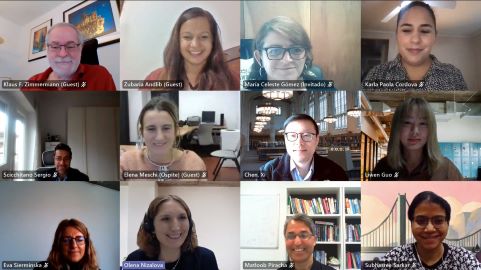
The GLO Virtual Young Scholars Program (GLO VirtYS) 2021/2022 has started its activity.
In the spirit of the GLO Mission, the GLO VirtYS program’s goal is to contribute to the development of the future generation of researchers, who are committed to the creation of policy-relevant research, are well equipped to work in collaboration with policy makers and other stakeholders, and adhere to the highest standards of academic integrity. This goal is achieved through the process of working on a specific research paper within the duration of the program, which is 9 months, and interact with the GLO VirtYS cohort and advisors.
Under the leadership of GLO VirtYS Program Director Olena Nizalova, the participants have virtually met with GLO officials and advisors on November 10 2021 for a warm welcome and first interactions. GLO President Klaus F. Zimmermann and GLO Director Matloob Piracha made introductory remarks. Program participants presented their research plans.
The following program participants have been appointed GLO Affiliate:
Zubaria Andlib, Shweta Bahl, Karla Cordova, María Celeste Gómez, Guo Liwen and Subhasree Sarkar
This is an all-female group.
GLO VirtYS Advisors for this cohort are: Catalina Amuedo-Dorantes, Xi Chen, Elena Meschi, Sergio Scicchitano, Eva Sierminska, and Maria Enrica Virgillito
Snapshot from the first meeting:
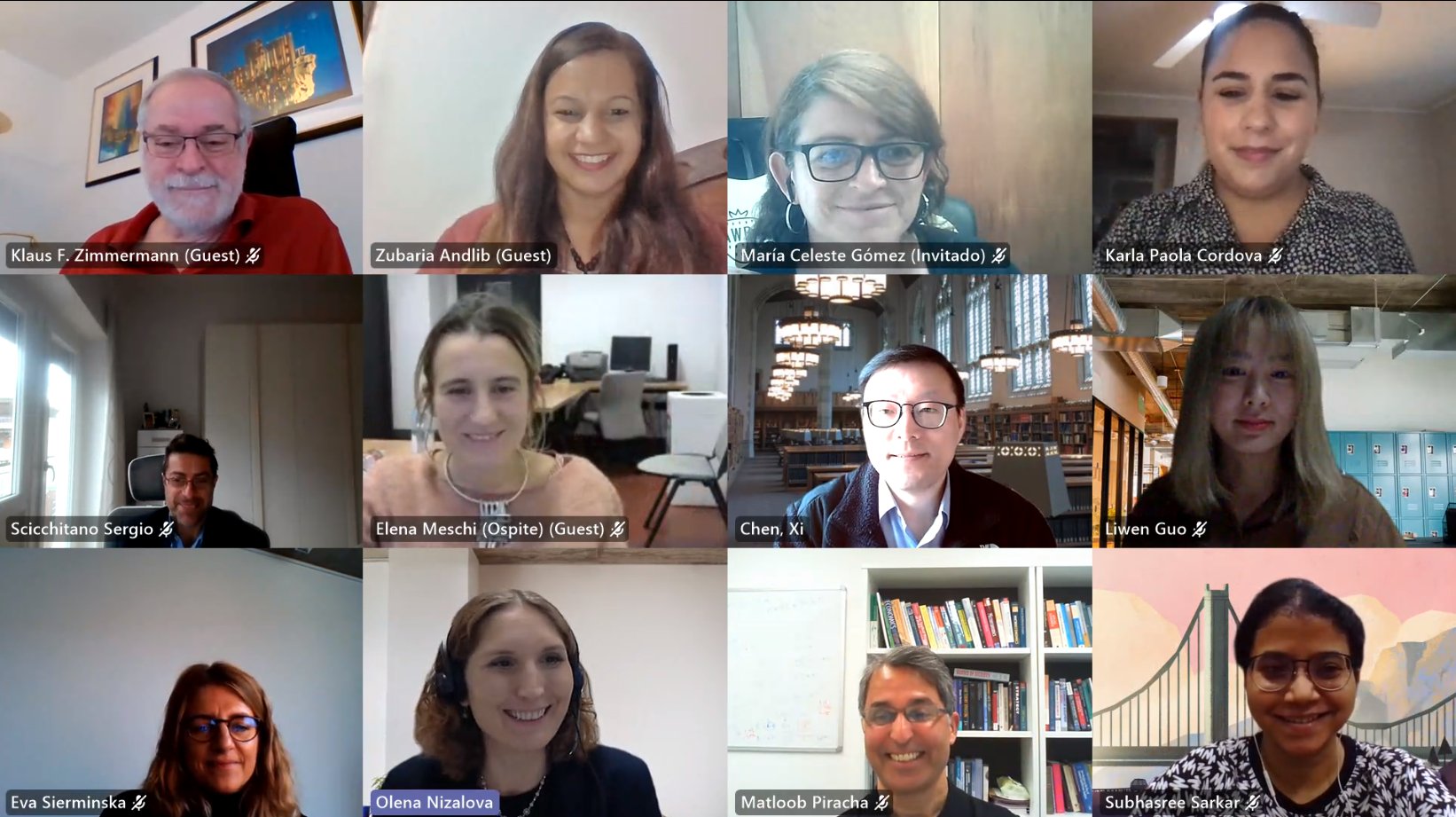
Ends;

A new GLO Discussion Paper provides a complete picture of nonmandatory participatory work practices.
GLO Discussion Paper No. 968, 2021
Complementarity in Employee Participation Systems – Download PDF
by Burdin, Gabriel & Kato, Takao
Author Abstract: This chapter describes the nature, scope and effects of various non-mandated participatory work practices in Japan, the U.S. and Europe through the lens of organizational complementarity theory. Specifically, rather than being treated in isolation, each work practice is considered an element of HIWS (High Involvement Work System), an employment system comprised of clusters of complementary work practices. In so doing, the chapter provides a complete picture of nonmandatory participatory work practices. Furthermore, by applying the common framework of viewing participatory work practices as complementary elements of HIWS to seemingly disparate forms of work practices in different parts of the world, the chapter sheds light on how participatory work practices play out in diverse institutional, cultural and regulatory environments.

GLO Discussion Papers are research and policy papers of the GLO Network which are widely circulated to encourage discussion. Provided in cooperation with EconStor, a service of the ZBW – Leibniz Information Centre for Economics, GLO Discussion Papers are among others listed in RePEc (see IDEAS, EconPapers). Complete list of all GLO DPs – downloadable for free.
The Global Labor Organization (GLO) is an independent, non-partisan and non-governmental organization that functions as an international network and virtual platform to stimulate global research, debate and collaboration.
Ends;